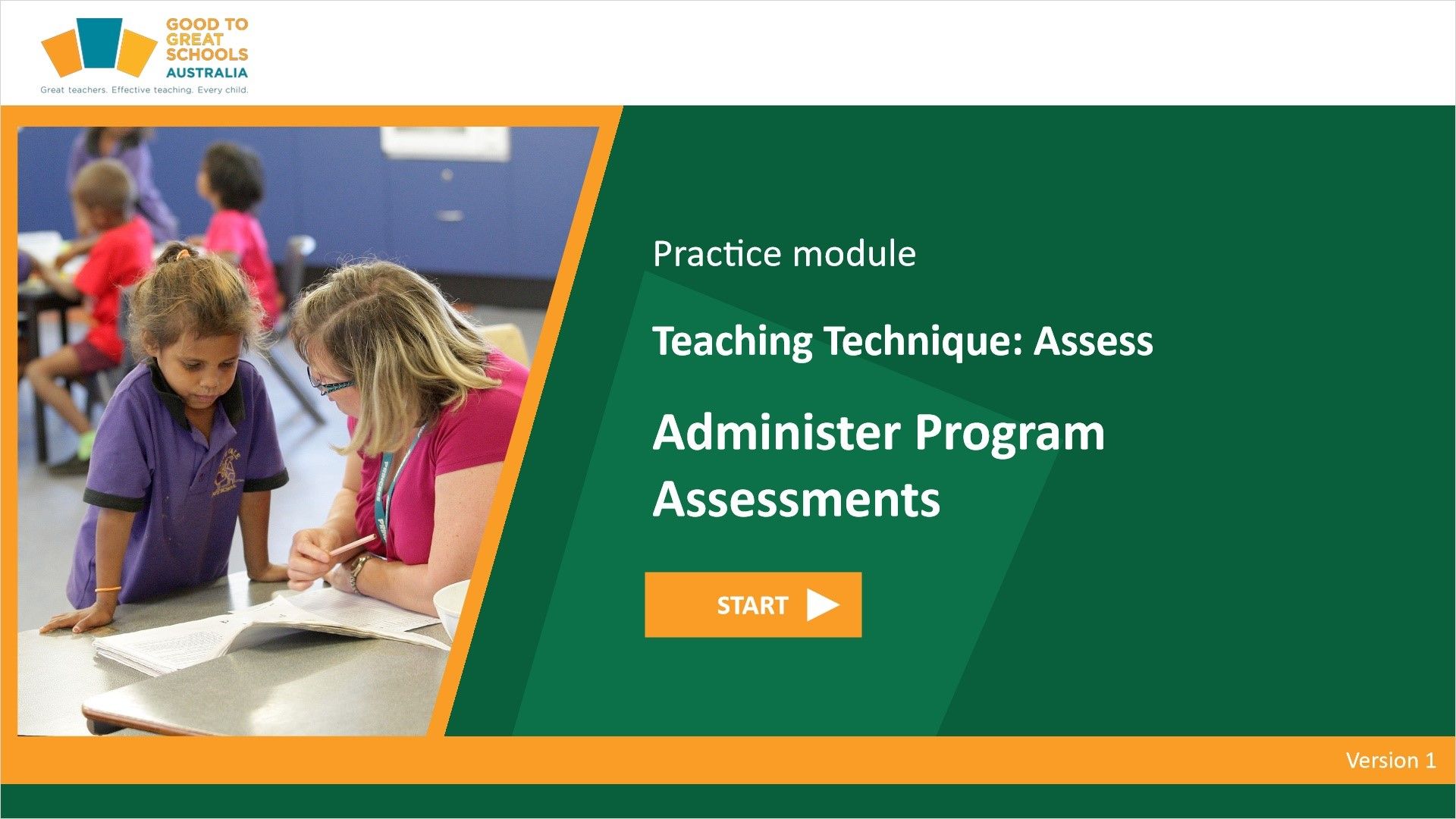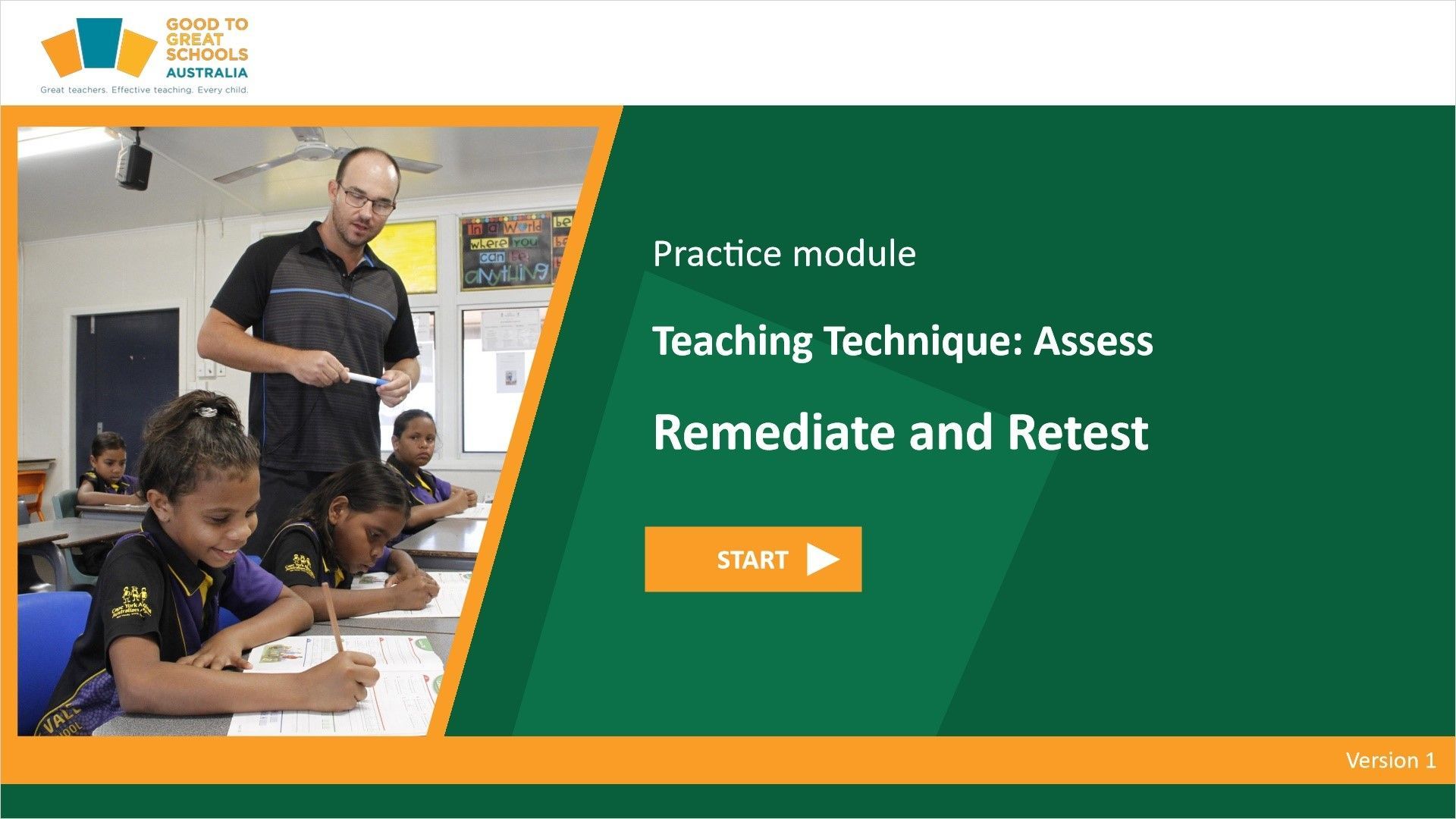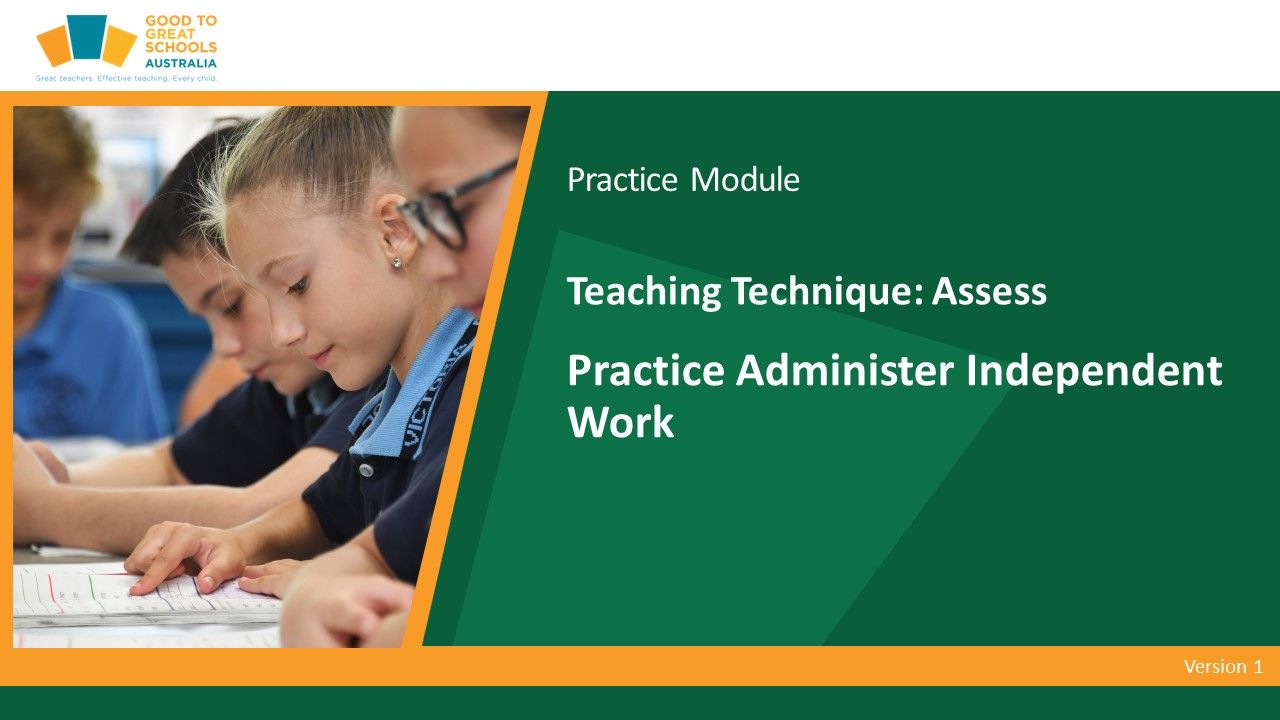Teaching Technique: Model (You Do)
Practice Modules
Overview

Assess: Administer Program Assessments
Administer Program Assessments is a practice module that goes in depth for participants to learn what happens when the technique is delivered with fidelity. They learn what happens when administering program assessments is not delivered with fidelity. They also learn how to overcome the barriers to administering assessments with fidelity.
Learning Intents
- Demonstrate program knowledge to set learning goals for direct instruction groups and use scaffolding through error correction and remedies and re-testing to ensure learning goals are met (TS1.1) (3.1.01).
- Demonstrate techniques that engage students and deliver lesson components to fidelity (TS1.2) (3.1.02). Understand basic direct instruction techniques and why they are used.
- Understand basic explicit instruction teaching techniques and why they are used. Demonstrate mastery of basic direct and explicit instruction techniques through weekly program practice sessions and then in classroom delivery (TS1.3) (3.1.03).
- Understand components of effective teaching resources (such as the Teacher Guide) that align with core programs. Communicate correct use of program components, such as Teacher Presentation Book, Teacher Guide, Student Workbooks, student books, etc. (TS1.4) (3.1.04).
- Implement lesson sequences with fidelity, maintaining student engagement and promoting learning (TS1.9) (3.1.09).
- Review key teaching techniques with colleagues in weekly practice sessions (TS1.10) (3.1.10).
- Understand basic effective teaching techniques and practices in academics and behaviour. Demonstrate ability to teach lessons using direct and explicit instruction teaching techniques (TS2.1) (3.2.01).
- Plan lesson presentation using direct and explicit instruction teaching techniques. Implement all parts of direct and explicit instruction lessons (TS2.7) (3.2.07).
- Plan group instruction based on mastery data and program guidelines. Implement direct and explicit instruction lessons with fidelity (TS2.8) (3.2.08).
- Understand how to use mastery test data to assess student learning. Demonstrate remedies and retesting as indicated in direct instruction following mastery tests and/or student checkouts and use correction procedure when students make errors (TS6.1) (3.6.01).
- Plan instructional time to implement mastery tests as indicated in the program. Implement in-program and out of program assessments to evaluate student mastery levels. Review mastery test data to determine individual and group mastery (TS6.6) (3.6.06).
Duration
- 4 Lessons.
Assessment
Assessment has two stages:
- Test: Knowledge and skills taught in the lessons
- Observation: Delivery with students of the knowledge and skills learned in the lessons.
Certification
None.

Assess: Remediate and Retest
Remediate and Retest is a practice module that goes in depth for participants to learn what happens when the technique is delivered with fidelity. They learn what happens when remediating and retesting is not delivered with fidelity. They also learn how to overcome the barriers to deliver remediating and retesting with fidelity.
Learning Intents
- Demonstrate program knowledge to set learning goals for direct instruction groups and use scaffolding through error correction and remedies and re-testing to ensure learning goals are met (TS1.1) (3.1.01).
- Demonstrate techniques that engage students and deliver lesson components to fidelity (TS1.2) (3.1.02).
- Understand basic direct instruction techniques and why they are used. Understand basic explicit instruction teaching techniques and why they are used. Demonstrate mastery of basic direct and explicit instruction techniques through weekly program practice sessions and then in classroom delivery (TS1.3) (3.1.03).
- Understand components of effective teaching resources (such as the Teacher’s Guide) that align with core programs. Communicate correct use of program components, such as Teacher Presentation Book, Teacher’s Guide, Student Workbooks, student books, etc. (TS1.4) (3.1.04).
- Implement lesson sequences with fidelity, maintaining student engagement and promoting learning (TS1.9) (3.1.09).
- Review key teaching techniques with colleagues in weekly practice sessions (TS1.10) (3.1.10).
- Understand basic effective teaching techniques and practices in academics and behaviour. Demonstrate ability to teach lessons using direct and explicit instruction teaching techniques (TS2.1) (3.2.01).
- Plan lesson presentation using direct and explicit instruction teaching techniques. Implement all parts of direct and explicit instruction lessons (TS2.7) (3.2.07).
- Plan group instruction based on mastery data and program guidelines. Implement direct and explicit instruction lessons with fidelity (TS2.8) (3.2.08).
- Understand how to use mastery test data to assess student learning. Demonstrate remedies and re-testing as indicated in direct instruction following mastery tests and/or student checkouts and use correction procedure when students make errors (TS6.1) (3.6.01).
- Plan instructional time to implement mastery tests as indicated in the program. Implement in-program and out of program assessments to evaluate student mastery levels. Review mastery test data to determine individual and group mastery (TS6.6) (3.6.06).
Duration
- 4 Lessons.
Assessment
Assessment has two stages:
- Test: Knowledge and skills taught in the lessons
- Observation: Delivery with students of the knowledge and skills learned in the lessons.
Certification
None.

Assess: Practice Administer Independent Work
Practice Administer Independent Work a practice module that goes in depth for participants to learn what happens when the technique is delivered with fidelity. They learn what happens when administering independent work is not delivered with fidelity. The barriers and how to overcome the barriers to administer independent work with fidelity.
Learning Intents
Demonstrate techniques that engage students and deliver lesson components to fidelity (TS1.2) (3.1.02).
Understand basic direct instruction techniques and why they are used. Understand basic explicit instruction teaching techniques and why they are used. Demonstrate mastery of basic direct and explicit instruction techniques through weekly program practice sessions and then in classroom delivery (TS1.3) (3.1.03).
Understand components of effective teaching resources (such as the Teacher Guide) that align with core programs. Demonstrate direct and explicit instruction concepts in developing independent work that aligns to the program being taught. Communicate correct use of program components, such as Teacher Presentation Book, Teacher Guide, Student Workbooks, student books, etc. (TS1.4) (3.1.04).
Implement re-teaching or skipping of direct instruction lessons, based on group mastery data, and in collaboration with instruction coach. Review direct instruction student mastery data daily to ensure groups stay at mastery. Review explicit instruction student mastery data daily to ensure groups stay at mastery (TS1.8) (3.1.08).
Plan independent work that promotes student learning. Implement lesson sequences with fidelity, maintaining student engagement and promoting learning (TS1.9) (3.1.09).
Review key teaching techniques with colleagues in weekly practice sessions (TS1.10) (3.1.10).
Plan independent work based on direct and explicit instruction program concepts. Implement classroom organisation strategies to engage students in their learning and make effective use of instructional time. Review student independent work to ensure students are engaging in the learning (TS1.11) (3.1.11).
Understand basic effective teaching techniques and practices in academics and behaviour. Demonstrate ability to teach lessons using direct and explicit instruction teaching techniques (TS2.1) (3.2.01).
Plan lesson presentation using direct and explicit instruction teaching techniques. Implement all parts of direct and explicit instruction lessons (TS2.7) (3.2.07).
Plan group instruction based on mastery data and program guidelines. Implement direct and explicit instruction lessons with fidelity (TS2.8) (3.2.08).
Duration
4 lessons.
Assessment
- Test: Knowledge and skills taught in the lessons
- Observation: Delivery with students of the knowledge and skills learned in the lessons.
Certification
- None
